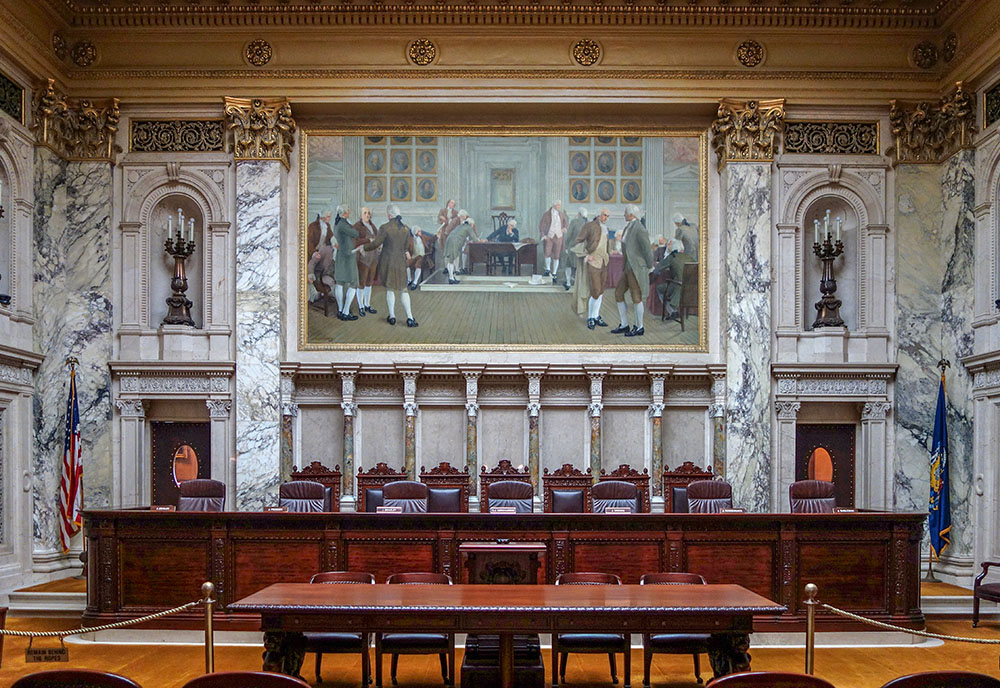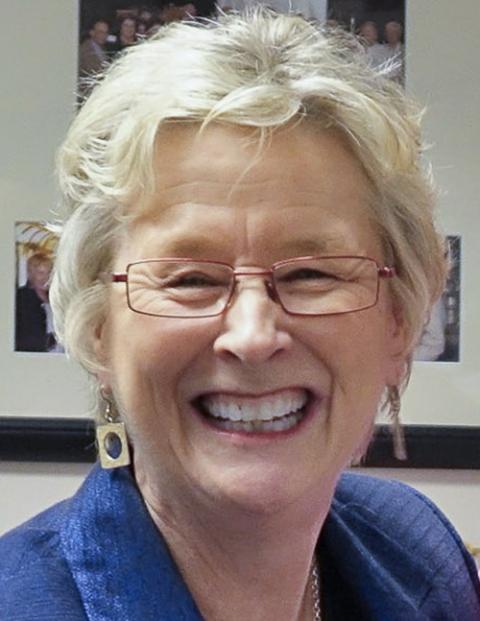
Interior view of the Wisconsin Supreme Court courtroom, inside the Wisconsin State Capitol building in Madison (Wikimedia Commons/Daderot)
A recent decision of the Wisconsin state Supreme Court held that Catholic Charities Bureau in Superior, Wisconsin, and its subentities are not exempt from paying into the state's unemployment insurance program because it "does not 'operate primarily for religious purposes.' " The ruling is bad law and should be overturned.
The case, Catholic Charities Bureau v. Wisconsin Labor & Industry Review Commission, highlights the degree to which anti-religious sentiments can hide behind an appearance of impartiality, in this case, a utilitarian ideology that informed the decision of the court.
Writing for the court, Justice Ann Walsh Bradley noted, "Individuals participating in the programs do not receive any religious training or orientation, and CCB and the sub-entities do not try to 'inculcate the Catholic faith with program participants.' "
Then, after some grammatical analysis of the statutes that strains the imagination, Bradley rightly notes, "Although the motivations of an organization certainly figure into the analysis, allowing self-definition to drive the exemption would open the exemption to a broad spectrum of organizations based entirely on a single assertion of a religious motivation."
Sometimes there is a large gulf between "entirely" and "sufficiently" and sometimes there isn't. Still, you would think a justice would err on the side of a generous interpretation of a foundational constitutional principle like the free exercise of religion or separation of church and state.
Not in this case. Finally, the utilitarian, secularist hammer falls:
CCB's and the sub-entities' activities are primarily charitable and secular. The sub-entities provide services to individuals with developmental and mental health disabilities. These activities include job training, placement, and coaching, as well as services related to activities of daily living. ... Such services can be provided by organizations of either religious or secular motivations, and the services provided would not differ in any sense.
For all the time rummaging around the dictionary — and a thesaurus! — Bradley does in her opinion, you would have thought it might have occurred to her to ask about the origin of the word "charity."
Religious liberty is a foundational principle of our American form of government. To borrow an analogy from card playing, an argument rooted in religious liberty is a strong card, an ace for example. It is not necessarily a trump card. If, for example, the Catholic Charities Bureau made no provision for its employees' unemployment insurance, the state's interest in providing for the general welfare of the population might trump the religious liberty claim. That is not the case here.
In 1986, the bishops of Wisconsin created their own program, the Church Unemployment Pay Program. As their website states, "The Church Unemployment Pay Program (CUPP) was developed to assist Wisconsin Roman Catholic parishes, schools, and other church employers meet their social justice responsibilities by providing church-funded unemployment coverage for lay employees in the Archdiocese of Milwaukee and the Dioceses of La Crosse, Madison, and Superior."
The Wisconsin court held this article of our faith — that we serve everyone regardless of their faith and do not seek to proselytize — against us.
Many dioceses throughout the country have similar programs because it saves money, just as many colleges and universities self-insure their employees for the same reason. This is not an attack on the common good, although there are marginal issues of justice and the common good at stake whenever you shrink an insurance pool.
Marginal issues do not overwhelm essential ones.
"Without assessing the specifics of the Wisconsin case or the workplace policies of these Catholic ministries, one critical misjudgment by critics and regulators needs to be addressed," John Carr, founder of Georgetown University's Initiative on Catholic Social Teaching in Public Life, explained to me in an email. "The fact that Catholic charitable ministries serve those in need regardless of their faith is a sign that they are in fact Catholic ministries, not simply secular agencies. When I served as secretary for social concerns in the Archdiocese of Washington, Cardinal [James] Hickey would consistently point out that 'we serve the hungry, homeless, and sick, not because they are Catholic, but because we are. We serve "the least of these" (Mt 25) because we believe they are Jesus in disguise and our judgment depends on how we care for them.' These charitable ministries are signs of the Gospel and works of our Catholic faith."
Instead, the Wisconsin court held this article of our faith — that we serve everyone regardless of their faith and do not seek to proselytize — against us.
N.B. I love the fact that the brief for the Catholic Charities Bureau cites Pope Benedict XVI on this point. "As Pope Benedict XVI explained, 'Those who practise charity in the Church's name will never seek to impose the Church's faith upon others.' Deus Caritas Est ¶ 31."
Advertisement
Bradley cannot choose to ignore the intimate link between our Catholic faith and what she calls our charitable activities and we call our ministries. Severing the motivations of our institutions from the actions they perform is an abstraction that doesn't hold up to scrutiny.
She notes that one of the subentities did begin as a non-Catholic agency but was subsequently taken over by the Catholic Charities Bureau, and that the tasks the staff performed were not altered by the change. The same might be true of a hospital that joins a Catholic network. An appendectomy is an appendectomy, right?
No. That work became a ministry when it became affiliated with the Catholic Church. And our ministries of service are as integral to our Catholic faith as is our liturgy.
The U.S. Supreme Court will surely reverse this terrible decision. What the court can't reverse is a certain blindness among some in secular society who fail to see how their secularism is an ideology and functions like a religion. Imposing it on us believers is as offensive, and unconstitutional, as if we Catholics sought to impose our beliefs on everyone else.
The constitutional guarantee of free exercise was meant to encourage people of diverse religions to live together amicably. The Wisconsin court decided its mission was to enforce a secularist, utilitarian point of view on us Catholics. It is tempting to assign Bradley and the three justices who joined the majority opinion three Hail Marys. Instead, we must be content knowing this bad ruling will be overturned.









